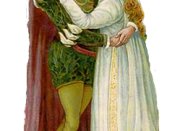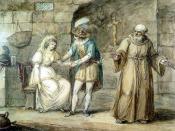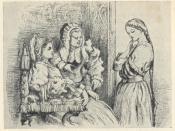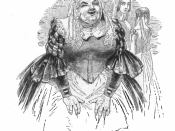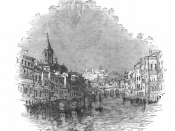Essay- Romeo and Juliet With whom does the ultimate responsibility for the deaths of the "star-crossed" lovers lie? The tragic ending of Shakespeare's Romeo and Juliet has caused the readers and audiences of the play to wander with whom the ultimate responsibility for the death of the "star-crossed lovers" lies. In order to decide fairly on the cause of the lovers demise, one must consider the issues of the roles of fate and chance which Shakespeare places great emphasis on. The raging feud between the families of Montague and Capulet also play a significant part in the play but the cause may simply be that the two young lovers are just that, too young, inexperienced and immature to cope with such a stressful and trying experience.
The people of Shakespeare's time were great believers of the roles of fate and fortune in their lives, and it also plays a very large part in the story of the "star-crossed lovers".
This description, one of the most famous quotes of Shakespeare's plays, is a suggestion of fate influencing the lives of these two teenagers. It suggests that no matter what the two lovers try to do, their "stars are crossed", and their story will end in tragedy. The idea of fate is so strong that it appears many times in the prologue, which at the first states the fact that their love is "death-marked".
The characters in Romeo and Juliet also feel that their lives are influenced by "fickle fortune". Romeo feels uneasy about going to the Capulet party, feeling that his "mind misgives some consequence yet hanging in the stars". He has an eerie premonition that if he goes to the party there will be terrible consequences.
Juliet also has a premonition later in the play, when the young lovers say goodbye for the last time after spending the night together. As he looks up to Juliet's balcony, she has "an ill-divining soul", and sees Romeo "as one dead in the bottom of a tomb".
There were also many events that occur in the play that can only be called bad luck, or fate. These include the death of Mercutio, the incident with the letter explaining Juliet's "death", and the fact that if Romeo had waited just one more second before taking poison Juliet would have awoken and they both would have lived.
There is also the undeniable fact that the fierce feud between the houses of Montague and Capulet was a major contribution to the deaths of Romeo and Juliet.
In the beginning of the play the "ancient grudge" between the two houses breaks to "new mutiny". This private war is so old that no one can even remember the cause of it, but that doesn't stop the mindless hatred between the houses. The attitude of the adults and Lords of the houses translates itself down to the younger generation, and that is where most of the trouble is caused. These young men are taught that the "other side" is inferior to them, but mostly that so is everyone else. They become very arrogant and violent, forming gangs that repeatedly clash in the streets of "fair Verona".
This arrogance is displayed in two ways: the witty, cutting taunts of the clever Mercutio, and the quick and unthinking violence of Tybalt, Romeo's cousin. Tybalt hates Montagues so much that at the very sound of the voice of a Montague, Tybalt tells his page to "fetch me my rapier, boy". It is this quick anger, and in part Mercutio's taunts that leads to Mercutio's death. This in turn leads to the exile of Romeo from "fair Verona walls" to Mantua, causing Juliet to take the potion, which puts her to sleep so that Romeo thinks she is dead and kills himself. When Juliet awakes she sees her dead lover and promptly stabs herself in the heart, "bury[ing] her parent's strife". It is quite ironic that the feud that causes the deaths of Romeo and Juliet is ended with their deaths.
It can also be considered that it was not fate or the feud that caused the deaths of the "star-crossed" lovers, but the fact that they were too young and impetuous to cope with their situation.
Many of the problems that occurred could have been averted if the lovers had thought things through a little more clearly before leaping into the fray. When the two beg Friar Lawrence to marry them he realises that their haste is going to cause problems, telling them to go "Wisely and slow. They stumble that run fast." They disregard his warnings, and when only hours after their marriage Tybalt kills Mercutio Romeo acts with "the unreasonable fury of a beast" an kills Tybalt, not thinking what effect this might have on his marriage. The two lovers prove their immaturity by acting melodramatically at news of Romeo's exile. Romeo threatens to kill himself, and after he has left for Mantua Juliet declares that she "longs to die". When she realises that the Nurse thinks she should marry Paris she totally rejects her, screaming "thou and my bosom shall hence-forth be twain!" .As a result of this tantrum Juliet has no one to turn to except Friar Lawrence, who devises an elaborate plan which ends in disaster.
After he is exiled to Mantua and receives word of Juliet's death he again acts with unreasoning haste and impetuousness and buys poison and travels straight to Verona. Had he waited even a few minutes before travelling Friar Lawrence's letter might have reached him, or even more importantly, in the tomb he would have arrived to find Juliet awake, and the tragedy of Romeo and Juliet would not have occurred.
There are many twists in the complex plot of Romeo and Juliet that make it difficult to decide with whom the responsibility of the deaths of the "star crossed" lovers lies. The main issues are of fate, the feud of the fathers and later the sons, and the lovers' immaturity. Although the other issues play large roles in the plot, the fact that Romeo and Juliet where unprepared by their ages to cope with such a complicated and painful situation means that they themselves could not prevent their own deaths. Ultimately the responsibility lies with Juliet and Romeo's impetuousness and lack of reason.
